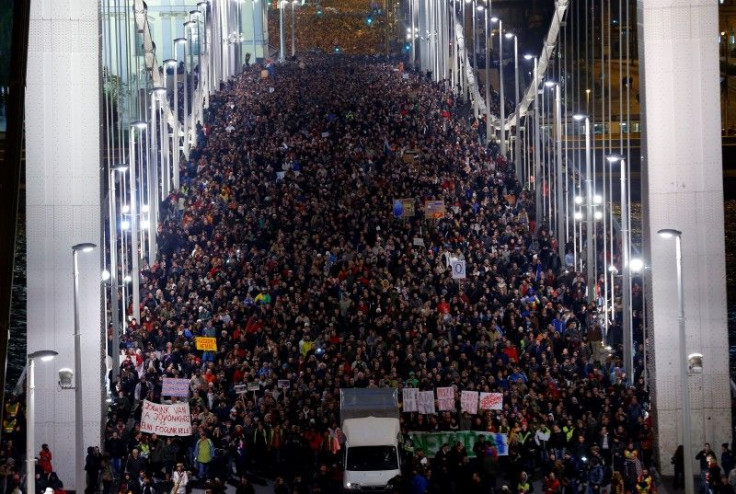Thousands Of Hungarians March In Protest Against Internet Tax

About 100,000 Hungarian protesters marched Tuesday against a planned tax on Internet use and criticized the government’s move as an attack on democracy. The demonstrators also reportedly demanded that Prime Minister Viktor Orban step down.
The rally, which is said to be the largest in the country since Orban came to power in 2010, is being viewed as an indication of rising discontent among the country’s youth against Orban's policies. The 51-year-old leader has also been criticized for imposing special taxes on the banking, retail, energy and telecommunications sectors, which critics fear could jeopardize Hungary’s economy. Tuesday's demonstrations were the second in three days after protests took place on Sunday.
“People were willing to pay for the service because they knew, saw and felt that their lives were becoming better... The Internet tax threatens the further growth of the Internet as well as freedom of information,” Reuters quoted Zsolt Varady, an Internet entrepreneur, as saying to the crowd, adding that the new tax is an attack on Internet freedom.
Varady was the founder of iwiw.hu, a Facebook-based Hungarian social network, which organized the crowd that marched through central Budapest. Demonstrators -- with signs reading “ERROR!” and “How many times do you want to skin us?” -- demanded the withdrawal of the planned tax as well as the ouster of Orban, Reuters reported.
The Hungarian government plans to charge Internet service providers 700 forints ($2.89) for an individual subscriber and 5,000 forints ($20.64) for a business subscriber every month. The tax was initially set to be 150 forints per gigabyte of Internet traffic, but Orban's governing party, Fidesz, said that it would set a cap on the tax rates, The New York Times reported.
While the government has argued that the Internet tax would help generate revenues from the telecommunications companies’ allegedly outsized profits, the move has been criticized as being “bad in principle.”
“Hungary is below the EU average in virtually every single digital indicator and the digital part of the economy is probably the main thing keeping Europe out of recession right now,” the Times quoted Ryan Heath, spokesman for EU Digital Commissioner Neelie Kroes, as saying. “So taxing that ... is a particularly bad idea.”
© Copyright IBTimes 2025. All rights reserved.






















